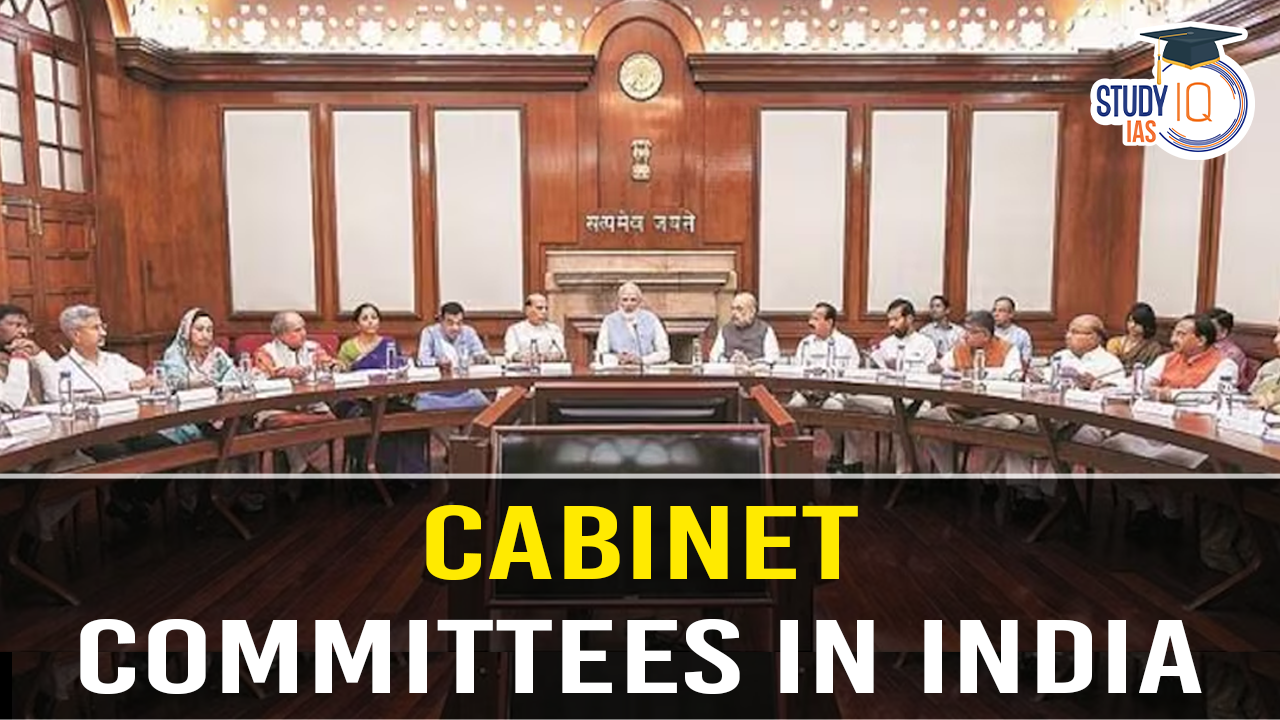Table of Contents
Context: Prime Minister Narendra Modi has convened key meetings of the Cabinet Committee on Political Affairs (CCPA) and Cabinet Committee on Security (CCS) following the recent terror attack in Pulwama.
Cabinet Committees in India play a crucial role in governance, aiding policy formulation and decision-making across various sectors. Understanding their structure, functions, and significance is essential for grasping India’s governance framework.
What are Cabinet Committees in India?
Cabinet committees are specialised groups within a government’s executive branch, comprising selected Cabinet members and sometimes non-Cabinet officials. They convene to address specific policy areas or governance challenges, aiding in decision-making and policy formulation.
These Cabinet Committees, chaired by the Prime Minister if he is a member, simplify governance, encourage coordination among ministries, and facilitate effective implementation of government programs. Each committee has different functions to perform, helping in efficient policymaking and administration.
List of Cabinet Committees in India
1. Appointments Committee of the Cabinet (ACC)
2. Cabinet Committee on Accommodation
3. Cabinet Committee on Economic Affairs (CCEA)
4. Cabinet Committee on Parliamentary Affairs
5. Cabinet Committee on Political Affairs (CCPA)
6. Cabinet Committee on Security (CCS)
7. Cabinet Committee on Investment and Growth
8. Cabinet Committee on Employment & Skill Development
Why is the Cabinet Committee on Security (CCS) most important?
The Cabinet Committee on Security (CCS) is most important as it takes charge of issues related to national security. It consists of prominent ministers, such as those who handle defence, home affairs, finance, and external affairs, and it makes important decisions concerning defence spending, internal security, law and order, and foreign policy on issues of security.
Since the Prime Minister usually chairs the CCS, its verdicts have far-reaching consequences for the security architecture of the country and make it the most important Cabinet committee.
Cabinet Committees: Formation and Structure
- The Prime Minister sets up the cabinet committees in the executive part of the government.
- They target areas of policy focus or governance needs.
- The Prime Minister presides over these committees if he is a member.
- Other members are usually chosen Cabinet members and occasionally non-Cabinet members.
- Such committees enable precise deliberations and the participation of influential stakeholders in making decisions.
- Their design enables effective coordination and cooperation between government departments and officials.
Types of Cabinet Committees
Some of the key Cabinet committees in India are the Appointments Committee of the Cabinet, Cabinet Committee on Economic Affairs, Cabinet Committee on Political Affairs, and Cabinet Committee on Security. These committees deal with specific governance issues.
| Cabinet Committees Name | Purpose and Focus |
|---|---|
| Appointments Committee of the Cabinet | Making appointments to top-level government positions, including bureaucratic and administrative posts. |
| Cabinet Committee on Economic Affairs | Formulating economic policies, focusing on investment, growth, infrastructure development, and fiscal management. |
| Cabinet Committee on Political Affairs | Addressing political developments, inter-governmental relations, and coordination among political stakeholders. |
| Cabinet Committee on Security | Primary responsibility for national security matters, including defence, internal security, and foreign affairs. |
| Cabinet Committee on Investment and Growth | Accelerating investment, promoting economic growth, and addressing bottlenecks in infrastructure and industrial development. |
| Cabinet Committee on Parliamentary Affairs | Handling matters related to parliamentary procedures, legislative business, and coordination between the executive and legislative branches. |
| Cabinet Committee on Employment & Skill Development | Addressing issues related to employment generation, skill development initiatives, and workforce management strategies. |
| Cabinet Committee on Accommodation | Oversight of government accommodation, including allocation, management, and maintenance of residential and office spaces for government officials. |
Functions and Responsibilities of Cabinet Committees
The cabinet committees are assigned the responsibility to deliberate on designated policy areas, solve intricate issues, and draw up proposals for consideration by the entire Cabinet. They are critically involved in decision-making, policy-making, and oversight, handling a broad gamut of governance issues. Each committee’s functions and duties are designed to solve the particular problems within its ambit. Some of the most prominent Cabinet committees in India are:
1. Appointments Committee of the Cabinet (ACC)
The Appointments Committee of the Cabinet (ACC) is a top-level committee of the Government of India responsible for making important decisions regarding appointments to top jobs in the central government and public sector undertakings.
Composition
- Prime Minister.
- Shri Amit Shah, Minister of Home Affairs and Minister of Cooperation.
2. Cabinet Committee on Accommodation
The Cabinet Committee on Accommodation (CCA) is a special committee under the Government of India that deals with the government accommodation allotment. The CCA lays down rules, regulations, and terms and conditions for the allotment of government housing, including out-of-turn allotments.
Composition
- Shri Amit Shah, Minister of Home Affairs and Minister of Cooperation.
- Shri Nitin Jairam Gadkari, Minister of Road Transport and Highways.
- Smt. Nirmala Sitharaman, Minister of Finance and Minister of Corporate Affairs.
- Shri Manohar Lal, Minister of Housing and Urban Affairs, and Minister of Power.
- Shri Piyush Goyal, Minister of Commerce and Industry.
Special Invitee
Dr. Jitendra Singh, Minister of State (lndependent Charge) of the Ministry of Science and Technology; Minister of State (lndependent Charge) of the Ministry of Earth Sciences; Minister of State in the Prime Minister’s Office; Minister of State in the Ministry of Personnel, Public Grievances and Pensions; Minister of State in the Department of Atomic Energy; and Minister of State in the Department of Space.
3. Cabinet Committee on Economic Affairs (CCEA)
The Cabinet Committee on Economic Affairs (CCEA) is a high-profile and important standing committee of the Union Cabinet of India. It plays an important role in guiding and coordinating the activities of the government in the economic domain.
The CCEA is entrusted with the task of examining economic trends, issues, and prospects to develop a consistent and integrated economic policy framework for the nation. It prepares policies concerning economic development, such as industrial policy, economic reforms, and fiscal management.
Composition
- Prime Minister.
- Shri Raj Nath Singh, Minister of Defence.
- Shri Amit Shah, Minister of Home Affairs; and Minister of Cooperation’
- Shri Nitin Jairam Gadkari, Minister of Road Transport and Highways.
- Shri Shivraj Singh Chouhan, Minister of Agriculture and Farmers Welfare; and Minister of Rural Development.
- Smt. Nirmala Sitharaman, Minister of Finance; and Minister of Corporate Affairs.
- Dr. Subrahmanyam Jaishankar, Minister of External Affairs.
- Shri H. D. Kumaraswamy, Minister of Heavy lndustries; and Minister of Steel.
- Shri Piyush Goyal, Minister of Commerce and industry;
- Shri Dharmendra Pradhan, Minister of Education.
- Shri Rajiv Ranjan Singh alias Lalan Singh, Minister of Panchayati Raj; and Minister of Fisheries, Animal Husbandry and Dairying
4. Cabinet Committee on Parliamentary Affairs
Cabinet Committee on Parliamentary Affairs (CCPA) is an important permanent committee of the Union Cabinet of India that specifically addresses the conduct of government business in Parliament and matters connected therewith. The CCPA closely monitors the progress of government legislative and other business in both Houses of Parliament (Lok Sabha and Rajya Sabha).
Composition
- Shri Raj Nath Singh, Minister of Defence.
- Shri Amit Shah, Minister of Home Affairs; and Minister of Cooperation.
- Shri Jagat Prakash Nadda, Minister of Health and Family Welfare; and Minister of Chemicals and Fertilizers.
- Smt. Nirmala Sitharaman, Minister of Finance; and Minister of Gorporate Affairs.
- Shri Rajiv Ranjan Singh alias Lalan Singh, Minister of Panchayati Raj; and Minister of Fisheries, Animal Husbandry and Dairying.
- Dr. Virendra Kumar, Minister of Social Justice and Empowerment.
- Shri Kinjarapu Rammohan Naidu, Minister of Civil Aviation.
- Shri Jual Oram, Minister of Tribal Affairs.
- Shri Kiren Rijiju, Minister of Parliamentary Affairs; and Minister of Minority Affairs.
- Shri C R Patil, Minister of Jal Shakti.
Special Invitee
Shri Arjun Ram Meghwal, Minister of State (Independent Charge) of the Ministry of Law and Justice, and Minister of State in the Ministry of Parliamentary Affairs. Dr. L. Murugan, Minister of State in the Ministry of Information and Broadcasting, and Minister of State in the Ministry of Parliamentary Affairs.
5. Cabinet Committee on Political Affairs (CCPA)
The Cabinet Committee on Political Affairs (CCPA) is often regarded as the “Super Cabinet” because of its importance in tackling important political and policy issues. It is a strong standing committee of the Union Cabinet of India. The CCPA decides and discusses key political developments and issues confronting the country.
Composition
- Prime Minister.
- Shri Raj Nath Singh, Minister of Defence.
- Shri Amit Shah, Minister of Home Affairs, and Minister of Cooperation.
- Shri Nitin Jairam Gadkari, Minister of Road Transport and Highways.
- Shri Jagat Prakash Nadda, Minister of Health and Family Welfare, and Minister of Chemicals and Fertilisers.
- Smt. Nirmala Sitharaman, Minister of Finance and Minister of Corporate Affairs.
- Shri Piyush Goyal, Minister of Commerce and Industry.
- Shri Jitan Ram Manjhi, Minister of Micro, Small and Medium Enterprises.
- Shri Sarbananda Sonowal, Minister of Ports, Shipping and Waterways.
- Shri Kinjarapu Rammohan Naidu, Minister of Civil Aviation.
- Shri Bhupender Yadav, Minister of Environment, Forest and Climate Change.
- Smt. Annpurna Devi, Minister of Women and Child Development.
- Shri Kiren Rijiju, Minister of Parliamentary Affairs, and Minister of Minority Affairs.
- Shri G. Kishan Reddy, Minister of Coal and Minister of Mines.
6. Cabinet Committee on Security (CCS)
Cabinet Committee on Security (CCS) is the highest body in the Government of India that addresses issues about national security, defence policy, and foreign affairs, which have implications for India’s security interests. It is very important in the country’s decision-making process on these vital matters.
Composition
- Prime Minister.
- Shri Raj Nath Singh, Minister of Defence.
- Shri Amit Shah, Minister of Home Affairs, and Minister of Cooperation.
- Smt. Nirmala Sitharaman, Minister of Finance, and Minister of Corporate Affairs.
- Dr. Subrahmanyam Jaishankar, Minister of External Affairs
7. Cabinet Committee on Investment and Growth
Cabinet Committee on Investment and Growth is an important standing committee of the Union Cabinet of India. It was constituted in 2019 with the basic mandate of recognizing and solving problems that discourage investment and economic growth in India. The committee has the mandate of creating strategies and policies to attract domestic and foreign investments in different sectors of the Indian economy.
Composition
- Prime Minister.
- Shri Raj Nath Singh, Minister of Defence.
- ShriAmit Shah, Minister of Home Affairs and Minister of Cooperation.
- Shri Nitin Jairam Gadkari, Minister of Road Transport and Highways.
- Smt. Nirmala Sitharaman, Minister of Finance and Minister of Corporate Affairs.
- Shri Piyush Goyal, Minister of Commerce and Industry.
- Shri Pralhad Joshi, Minister of Consumer Affairs, Food and Public Distribution, and Minister of New and Renewable Energy.
- Shri Giriraj Singh, Minister of Textiles.
- Shri Ashwini Vaishnaw, Minister of Railways, Minister of Information and Broadcasting, and
- Minister of Electronics and Information Technology.
- Shri Jyotiraditya M. Scindia, Minister of Communications, and Minister of Development of North Eastern Region.
- Shri Hardeep Singh Puri, Minister of Petroleum and Natural Gas.
- Shri Chirag Paswan, Minister of Food Processing Industries.
Special Invitee
Rao lnderjit Singh, Minister of State (lndependent Charge) of the Ministry of Statistics and Programme lmplementation; Minister of State (lndependent Charge) of the Ministry of Planning; and Minister of State in the Ministry of Culture. Shri Prataprao Jadhav, Minister of State (lndependent Charge) of the Ministry of Ayush; and Minister of State in the Ministry of Health and Family Welfare,
8. Cabinet Committee on Employment & Skill Development
Cabinet Committee on Employment & Skill Development is an important permanent committee of the Union Cabinet of India. It focuses mainly on giving directions to all employment and skill development policies, programmes, schemes, and initiatives in the nation, ultimately for improving workforce participation and promoting employment growth.
Composition
- Prime Minister.
- Shri Raj Nath Singh, Minister of Defence.
- Shri Amit Shah, Minister of Home Affairs and Minister of Cooperation.
- Shri Nitin Jairam Gadkari, Minister of Road Transport and Highways.
- Smt. Nirmala Sitharaman, Minister of Finance and Minister of Corporate Affairs.
- Shri Piyush Goyal, Minister of Commerce and Industry.
- Shri Dharmendra Pradhan, Minister of Education.
- Shri Ashwini Vaishnaw, Minister of Railways, Minister of Information and Broadcasting, and Minister of Electronics and Information Technology.
- Shri Bhupender Yadav, Minister of Environment, Forest and Climate Change.
- Shri Gajendra Singh Shekhawat, Minister of Culture and Minister of Tourism.
- Shri Hardeep Singh Puri, Minister of Petroleum and Natural Gas.
- Dr. Mansukh Mandaviya, Minister of Labour and Employment, and Minister of Youth Affairs and Sports.
Special Invitee
Shri Jayant Chaudhary, Minister of State (Independent Charge) of the Ministry of Skill Development and Entrepreneurship, and Minister of State in the Ministry of Education.
Significance of Cabinet Committees
- Strategic Decision-Making: Cabinet committees provide a platform for in-depth deliberations and strategic decision-making on critical issues affecting the nation’s governance and security.
- Policy Formulation: They play a crucial role in formulating policies, strategies, and action plans across various sectors, ensuring coherence and alignment with the government’s objectives.
- Coordination and Oversight: Cabinet committees facilitate coordination among different ministries and departments, ensuring effective implementation of government policies and programs.
- Crisis Management: During times of crisis or emergencies, such as natural disasters or security threats, these committees play a central role in coordinating responses and mobilising resources to address the situation effectively.
- Enhanced Accountability: By reviewing and monitoring the implementation of decisions, Cabinet committees contribute to enhanced accountability and transparency in governance.
Cabinet Committees UPSC
Cabinet committees are specialised groups within a government, addressing specific policy areas or governance challenges. Key types include the Appointments Committee of the Cabinet, Cabinet Committee on Economic Affairs, and Cabinet Committee on Security. Chaired by the Prime Minister, these committees comprise selected Cabinet members and sometimes non-Cabinet officials. They facilitate focused deliberations, ensuring key stakeholders are involved in decision-making processes. Their structure enables efficient coordination and collaboration among government officials and departments.


 SLAPP Suits: Meaning, Examples, Impact o...
SLAPP Suits: Meaning, Examples, Impact o...
 Finance Commission of India, Articles an...
Finance Commission of India, Articles an...
 High Number of Pending Cases in Supreme ...
High Number of Pending Cases in Supreme ...

























